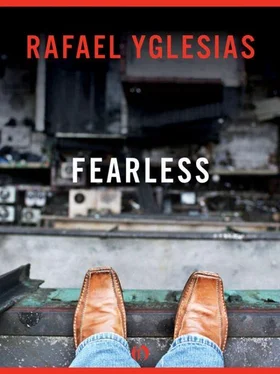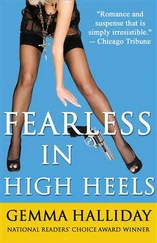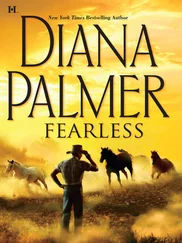Max took them with a smile. His hands were still out, offered to her. He whispered, “Come with me?”
Her mother didn’t make another move to interfere. She stared in dumb admiration at her merry daughter.
“Sure, I’ll go,” Carla said to Max and gave him her hand.
His car was comfortable. It was foreign, a name she didn’t recognize or know how to pronounce. Max told her it was pronounced sob .
“I don’t like that name,” she said and was nervous. The troubles she’d had since the crash whenever she went out had begun. Her hands were moist and her stomach hurt. Each breath stuck in her throat; there seemed to be only a little space left to fill up with air. “Is this a good car?” she said. Her voice was weak and her ears were stopped up with the noise of her own frightened blood. She could hardly hear herself ask the question.
“It’s a very safe car,” he said as he pulled away from the curb. “Very safe and I’m an excellent driver. Never been in an accident — not while I was behind the wheel anyway. And you know what? It doesn’t mean we’re going to survive this ride. Because even if I do everything right, even with us strapped in, and with the marvelous technology of the Saab’s collapsing cage and its reinforced doors and roof, we could still be crushed to death or hurled to death. We’re not safe because of the car or because I drive defensively.”
“What?” she asked. She forgot about trying to absorb air from the small sac of it in her throat. She looked at Max. He smiled at her, at ease and friendly. How old was he? His graying kinky hairs didn’t tell her much, because it was the kind of white hair that can come early. His face was lined at the eyes and mouth, but only a little and he had the kind of fair skin that wrinkled easily. He could be as young as thirty or as old as fifty. “What did you say?” she asked, not really believing she had understood.
“We’re not safe. No matter how good this car is, no matter how carefully I drive. I’m not telling you anything you don’t know. You know we’re not safe — that’s why you’re scared.”
Carla laughed. “Everybody else keeps telling me things are safe. You’re just saying the opposite to fool me.”
“No. I’m not playing a mind game. It’s the truth. It’s not safe. In fact, you’re not safe sitting in your apartment. On Mulberry Street you’re hardly more than a mile away from one of the biggest faults in the United States. Someday, maybe in a few minutes, there’ll be seven plus, maybe even an eight earthquake. This city isn’t built for it. You’d be dead. My guess is more than a million people would die right away. And even if you survived you might eventually die. Since this is an island, with all the gas lines and the density — people could be trapped on Manhattan with an inferno around them and no way to escape or to fight it.”
Carla shifted a bit and took a good look at this man, a stranger really, with whom she was now stuck. He looked Jewish to her: very pale skin, a relatively short man with nervous hair who seemed never to have done any physical labor. His hands were smoother than hers; she’d bet they were softer too. But he had good features, a broad smart forehead, beautiful pale blue eyes, a reasonable nose and a wonderful mouth that seemed to curve twice at the ends, subtly down and subtly up so that he could look sad or happy with only a small change in their undulations. “You told me I was safe with you,” she said, feeling betrayed.
“You are. But not because the car is safe or New York is safe. We’re safe because we died already.”
That scared her. Sunlight glared on the cold streets. A beam flashed off a car’s fender, blinding her. She was terrified. Maybe she was actually dead; maybe this was purgatory, believing you were alive, but having no feelings except sad ones and hating the people you love. “I’m not dead!” she yelled.
“No, you’re not,” he said. He steered the car crosstown, heading west. He was calm. “I didn’t say that. I said you’ve died already. You’ve passed through death. You’re alive now. Both of us are. All of the survivors are. Don’t you see? Everybody else”—he gestured at the streets, at the people hurrying to their destinations, hunched against the cold, scurrying with the fear of hunted mice—“they don’t know what it is to die in their minds like we did.”
“That’s bullshit.” She turned even more in his direction. The seat belt pulled taut against her shoulder. His face looked smooth and very young from this angle. She couldn’t see any sign of a beard on those white cheeks. He could be twelve years old. “I didn’t die in my mind. My baby died and I got hurt but I didn’t die, I didn’t think about dying, I just thought about my—” She stopped.
“You just thought about what? How your baby died?”
He had steered onto the West Side Highway extension heading uptown. “Where are you going?” Carla demanded. She wasn’t scared or nervous. But she thought he was crazy and she wasn’t sure if she wanted to be alone with him in a car.
“The Sawmill.”
“The what? You mean out of the city?”
“Yes. The Sawmill is such a great winding road and so pretty. It was built to please the rich.” Irrationally he gestured at the river and the rotting dock structures. “Well, the middle class anyway. To be a pleasant road for a Sunday drive. The man who designed it—” Max chuckled, “his name was Moses — he imagined a world full of happy, prosperous self-satisfied people with good-natured servants and shiny cars that never broke down. And it didn’t bother him that his own brother died homeless. What an asshole. No, he wasn’t an asshole,” he seemed to be arguing with someone else, someone who wasn’t in the car. “He wanted to build his dreams and not just be a good man. A stupid, gullible good man whom everybody cheats and ignores.”
“You talking about yourself?” Carla asked. She had definitely decided he was crazy, but she no longer feared him.
“Yes.” He smiled at her. “You’re smart,” he said and he meant it. He looked sane enough: his pale eyes were friendly; his bush of gray and black hair was benign. “Is it all right if we take a drive and see some trees even if their leaves are dead?”
This was her chance to stop it. He was reasonable and he would let her go back. But she felt comfortable. She had forgotten her small throat and sweaty palms. The car was warm and quiet, her seat ample and soothing. Seeing the miserable, cold, and frightened world through the hard clear glass of the windows felt good. It gave her a kind of strength. He was crazy but he was right — she was safe with him.
Two days later Max returned without phoning ahead and stood in the tiny foyer, his hands folded, to ask if she wanted to see scenic Jersey City. He shuffled his feet like an awkward adolescent asking her out on a date. She said yes, sure that he was kidding about the Jersey City part, but he wasn’t, he wanted to see the Newport Center Mall and that’s what they did, driving all around it while he made comments on the architecture and the surrounding old buildings, many of them deserted, even burned out. Later, when she returned home her mother made a big joke out of his idea of sight-seeing and probably Manny would have too, if Carla were talking to him, which she wasn’t. That was why she tolerated her mother’s reappearance from California with the intention of staying through New Year’s. With her mother there it was easier to ignore Manny.
Carla enjoyed Max’s tour. After they went around and through the Newport Mall by car, he pulled into its huge multileveled parking lot and asked if she wanted to eat some lunch. She was hungry. The same sort of gnawing hunger that came on suddenly in the middle of the night, a hunger for comforting foods, a hunger she couldn’t satisfy no matter how much she ate and a hunger that so far she had felt only when alone.
Читать дальше












